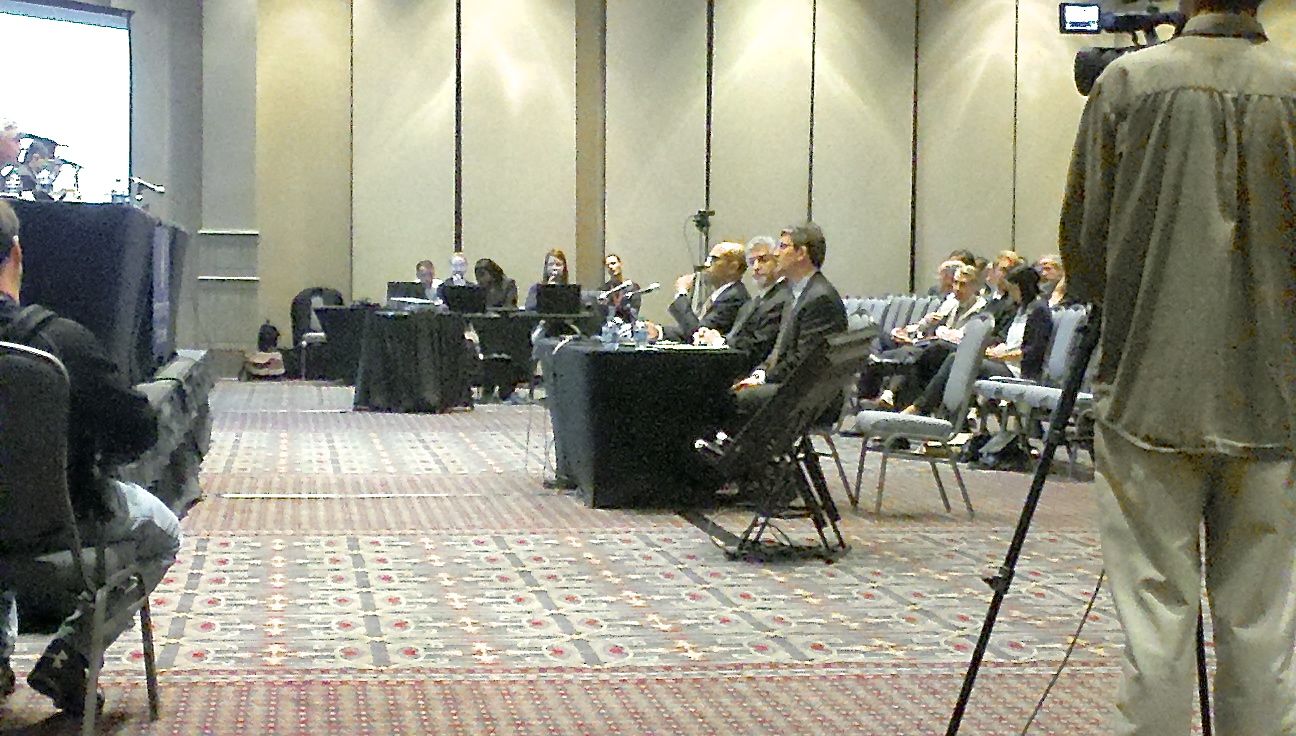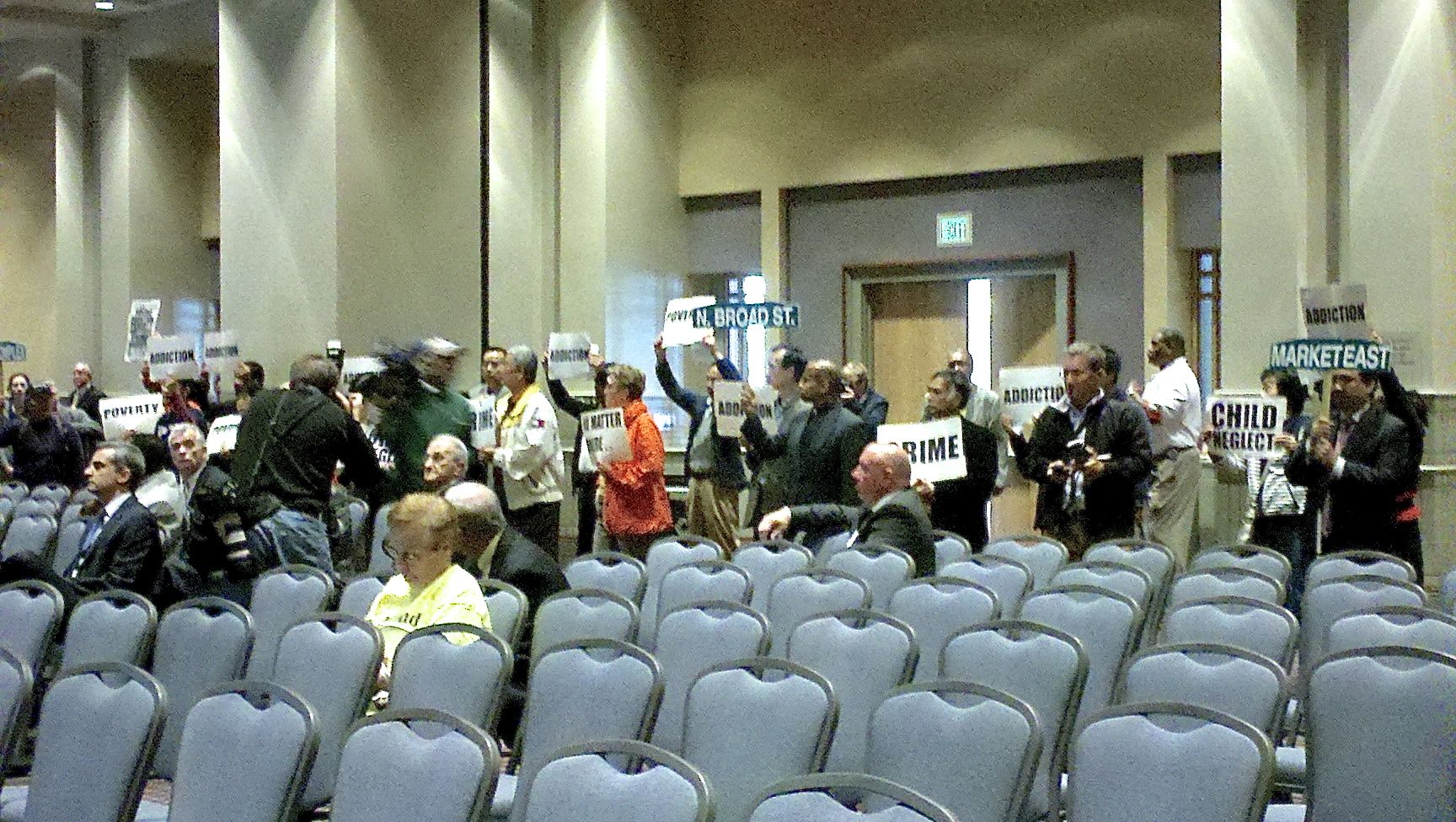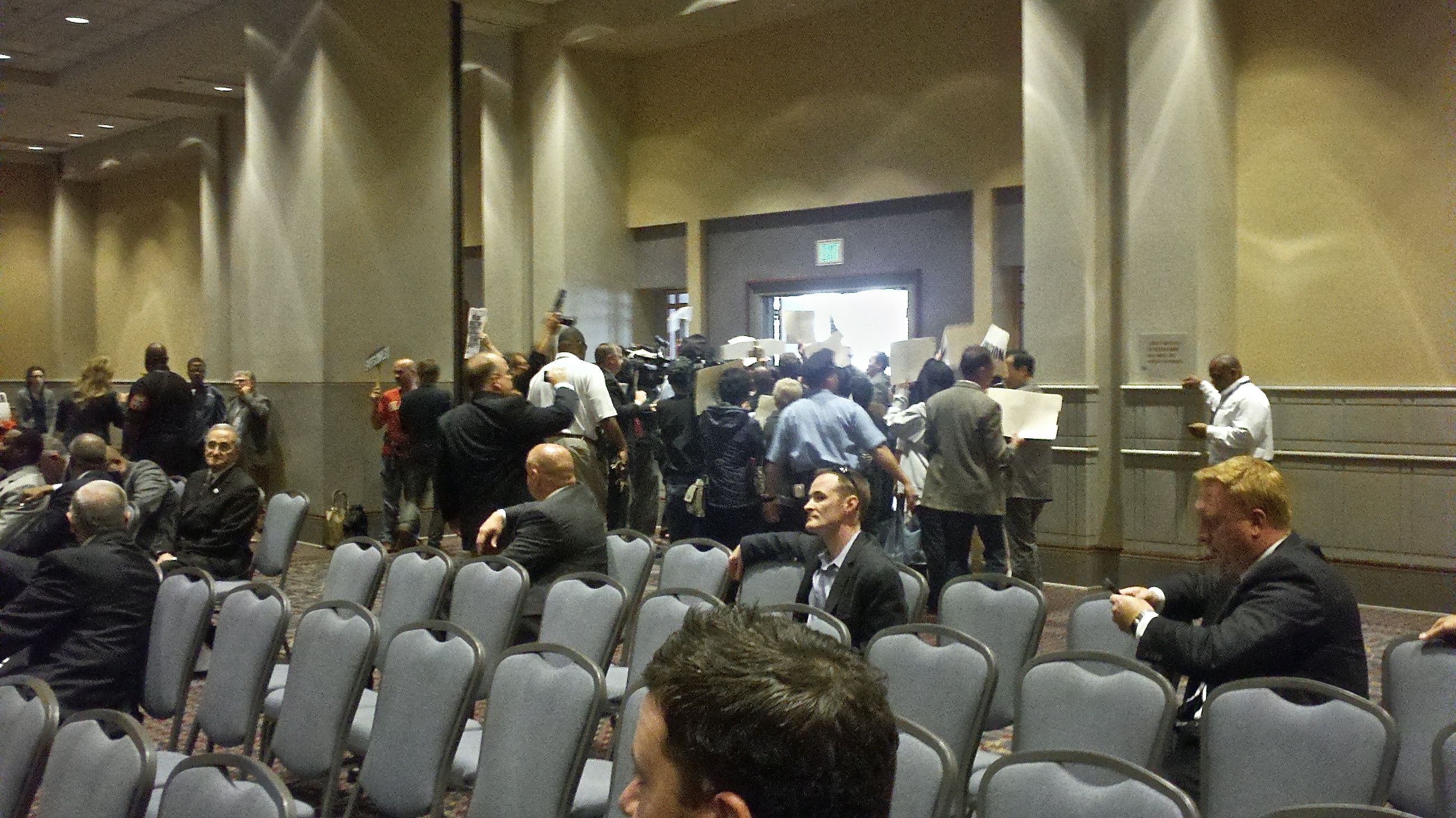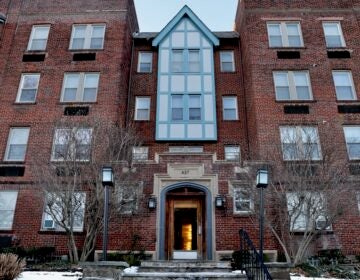Deputy Mayor: Center City casino proposals more likely to stimulate development, attract new audiences

The two casinos proposed for Center City – Market8 and The Provence – would make the most money and have the most potential to stimulate economic growth beyond their boundaries, Philadelphia Deputy Mayor for Economic Development Alan Greenberger told the Gaming Control Board Tuesday.
Conversely, Greenberger said the city’s analysis of the six applicants found that the three casinos proposed for South Philadelphia – Casino Revolution, Hollywood Casino Philadelphia and Live! Hotel and Casino – are “less likely to induce further development and less likely to generate a new audience” than Market8, The Provence or Wynn Philadelphia, proposed for the Central Delaware waterfront. These three also generated “the greatest level of community concern,” he said.
“Our analysis shows the two Center City Proposals – Market8 and The Provence – have the greatest potential to spur additional economic benefit associated with the awarding of a gaming license due to their location in key sections of the downtown and the provision of a range of additional mixed-use amenities in addition to the casino itself. It is our belief that Market8 on Market Street East will have the most immediate effect while The Provence is part of a longer-term revitalization of North Broad Street,” Greenberger testified at the hearing, held at the convention center.
Greenberger said the city has concerns that Wynn Philadelphia could potentially siphon customers from SugarHouse Casino, less than a mile away. This concern could be alleviated, however, if Wynn and SugarHouse worked together on a “plan to develop a mutually productive relationship between the two.”
Greenberger went on to say that “if that plan is augmented by a physical plan for development in the near mile between them, a powerful transformation could take place on our waterfront.” The Wynn development team “has been working on such a physical plan, but we are unsure to how it might get implemented.”
“SugarHouse is not engaged in collaborative discussions with any of the prospective developers,” said SugarHouse spokeswoman Leigh Whitaker in an email.
In respone to PGCB members’ questions, Greenberger said that some of the analysis includes “some educated guessing” because there are not many American examples of urban casinos. He’s seen them in international cities, he said, and while he can’t speak to the economics, they seem to function well in terms of impact on their surroundings. Greenberger also told the board the city wrestled with the phasing of some of the proposals and how much the city can really count on that happening in later phases. He said SugarHouse opened with an interim casino and has begun further work, but as far as finishing the complete project goes, “I’m not sure if they’ll ever get there.” It’s not that SugarHouse is doing something wrong, he said. “As casinos are opening in other places, the nature of the market changes.”
After the hearing, Greenberger said that Wynn, with his extensive casino experience and brand, might be able to make a Delaware Avenue casino perform better than its city-edge location would predict. While progress has been made toward the city’s goal of revitalizing the Delaware waterfront, there still isn’t much there, Greenberger said, but perhaps a Wynn casino could be a draw in its own right. But the city team wants more information from Wynn on how Wynn Philadelphia would attract national and international visitors to the city, nor much that differentiates Wynn Philadelphia from Wynn proposals for Toronto and Boston. “What makes somebody decide to come to this one?” he asked.
A written copy of Greenberger’s comments is attached at the bottom of this article. He and representatives of the city’s environmental, planning and engineering consultants AKRF outlined plusses and minuses of each proposal. They did not pick a favorite Tuesday. AKRF’s presentation is also attached below.
The information is part of what the PGCB will use to award the city’s second license – the one that was originally given to the never-got-off-the-ground Foxwood’s Casino in 2006. The board awarded a license to SugarHouse Casino then, too, and Philadelphia’s administration and citizenry complained that the city didn’t have much say in the process. The PGCB will consider the testimony, but the final decision rests with the board.
Greenberger’s testimony was interrupted by anti-casino activists, the No Casino In Our City Coalition. They held signs listing the various proposed locations and the problems they ascribe to gaming, such as addiction and spousal abuse. “No casino, no matter where!” they chanted. Those running the hearing let them chant for several minutes before police officers and security guards escorted the group of more than 100 out the doors. The chairman then asked that the doors be closed. Individual protestors came back into the room later. A Coalition statement, attached below, states that the participants oppose all of the casino options because gambling is a predatory industry. “We don’t acknowledge that this process is here to protect the public,” said participant Paul Boni, a local attorney who is a board member of Stop Predatory Gambling. (The protest starts at roughly the 25 minute mark of the video below this story.)
Greenberger told gaming board commissioners that the city analysis did not identify anything about any of the six proposals which should knock them out of the running. He told reporters after the hearing that he expects each proposal will continue to improve, and the city has not decided whether it will at some point choose a preferred applicant for the second license.
Here are more of the city’s comments on each proposed casino:
Casino Revolution, proposed by PHL Local Gaming, LLC, for 3333 South Front St.
Greenberger said a casino built at this large site with excellent highway access would have limited impact on surrounding residential and industrial communities or the Stadium District. The administration appreciated the attention paid to diversity, both in the management team and in stated hiring goals, and noted PHL Local Gaming’s plan to open earlier than the others by renovating an existing building, owned by team leader Joe Procacci. But between the location and the “low level of other uses and programming associated with the proposal, we feel that it is unlikely to appeal to a new audience or add to the existing gaming customer base in the city and region.”
The PHL team recently announced plans for an adjacent sports, recreation and entertainment area, but “it is our belief that these particular sites are best suited to industrial and logistical use … the same could be said of the proposed site itself, already a productive distribution point.”
Hollywood Casino, proposed by PA Gaming Ventures for 700 Packer Ave.
Greenberger called Penn National Gaming an experienced casino operator that knows the regional gaming marketplace well. “The City does not doubt that this team can develop and operate a successful casino.” The location has good highway access, but both the city and nearby residents are concerned what additional casino traffic would do to local neighborhoods on game- or concert days.
The casino developed the Philadelphia Casino Benefits Corporation, and Penn National says a guaranteed $2 million would go to the School District and City of Philadelphia Pension Fund, with future payments dependent on revenue. Since predicted future revenues for gaming are uncertain, the City wants a firmer explanation of the financial committment. The city also believes “choosing the proposal that will generate the largest overall economic benefit to Philadlephia over the long-term” makes the most sense, and the analysis shows that’s not Hollywood. “We project that this proposal will generate the lowest number of direct and indirect jobs once the casino is constructed, the lowest amount of total gaming and non-gaming revenue, and the lowest tax revenue to both the City of Philadelphia and the Commonwealth of Pennsylvania.”
Live! Hotel and Casino, proposed by Stadium Casino LLC for 900 Packer Avenue.
Greenberger noted that Live! also is proposed by “experienced operators with demonstrated track record in the regional casino market,” and said this proposal also has good highway access, but also could generate traffic that would impact heavily on neighborhoods during sporting and concert events.
The proposal is a partnership between Greenwood Racing and the Cordish Companies, which also owns XFINITY Live! in the stadium district. That connection is “a unique and encouraging aspect of this proposal,” he said. If a good relationship with the sports teams can be maintained and a walkable connection to XFINITY Live! created, “this proposal has the potential to create a more dynamic sports and entertainment district with a more active street life than currently exists,” he said. But the City doesn’t see that happening. “For this to be realized, the developer would need to develop and implement a proposal of high quality design standards for their project as well as for the street network between itself and XFINTY Live! However our experience working with the developer on the XFINITY Live! project would leave us with some concern about the likelihood of this happening.” The city supports the build-out of XFINITY Live!, but feels the “quality of the building and surrounding streetscape … is less than what was originally proposed and expected and we would need to hear from the applicant why this will not be the case with the casino proposal.” The analysis concludes that Live! would economically perform “only slightly better .. than Hollywood Casino.”
Market8, proposed by Market East Associates for 8th and Market streets.
Greenberger called it a “unique opportunity for a significant project in a critical section of our downtown on a prime site that has sat vacant for more than three decades. If done well, this project could have a transformative effect on Center City and would complement our existing efforts to rejuvenate Market Street East, a key priority for the Nutter Administration.”
The city is “excited by the level of on-street, mixed-use activity as it is our opinion that these facts, in addition to the gaming facilities, are crucial in terms of spurring additional economic development and revitalization.” The new activity could create a “new audience” and “is less likely to have a negative impact on existing gaming facilities in the city and region.”
Greenberger said the proximity to mass transit is a plus, and while gaming industry members have doubted whether gamblers will use mass transit, certainly employees would. Despite the mass transit, “there will need to be significant work with city and state transportation agencies to mitigate the inevitable traffic management issues associated with placing a large new facility at the heart of a dense downtown road network.” This site is the furthest of all six proposals from major highways.
The proximity of Jefferson University Hospital also makes traffic management a special concern. Parking is a concern because of the size of the site.
The site’s proximity to Jewelers Row “raises questions about problem gambling and the ability of patrons to quickly access cash through selling gold and other items of jewelry,” Greenberger said.
The Provence, proposed by Tower Entertainment, LLC, for 400 North Broad Street.
Greenberger said this proposal “also represents the opportunity for a major investment in a critical section of Center City” – North Broad Street. “We believe that the investment represented by The Provence has the potential to spur additional economic development in that section of the city and to complement a wide range of existing investments, including the expansion of the Pennsylvania Convention Center.” Greenberger noted that the convention center has doors near the Provence and another set near Market8. The city likes the plan to reuse “a major historic building,” the former Inquirer building.
The analysis shows that if The Provence is built as proposed, it has “the largest potential benefit in terms of operating jobs, gaming and non-gaming revenues and tax revenue to the City and the Commonwealth.” The mixed-use development has potential to attract new gaming customers, and therefore not impact existing casinos, he said. And Blatstein “has a demonstrated track record of major urban development and transformation in Philadelphia, notably in the Northern Liberties section of the city.”
The city’s concerns are that while the site is located off of a major highway interchange, the Vine Street Expressway, 15th and 16th streets are already congested. That would need to be addressed with the city and PennDOT, he said. The city also wants to hear more from the developer about how “the Provence can enhance activity along its various street frontages.”
Wynn Philadelphia, proposed by Wynn PA, Inc., 2001 Beach Street and 2001 through 2005 Richmond Street.
Greenberger said with Wynn’s track record, the city doesn’t doubt the project “will be delivered to its fullest extent in one phase which in and of itself represents a significant investment along our waterfront.” The city is “encouraged” by Wynn’s committment to parkland and public space along the Central Delaware, but “would like to see more detail from the applicant” about the design of that public space and its operation.
The site is “relatively isolated” from neighborhoods, and the city has had no expressions of concern from community organizations in that area. It has excellent highway access, and is in a section of the city that has “casino experience” because of SugarHouse. He told the board that the proximity to SugarHouse could harm SugarHouse, or could be beneficial to both casinos, depending on execution. And, like waterfront advocates, Greenberger expressed concern “about the extent to which the established Wynn product has been or will be tailored more specifically to Philadelphia.”
Said Greenberger: “The power of the Wynn brand is not to be taken for granted, but we do not yet see clearly how it integrates with the rest of the city.”
What’s next?
More details on the financial projections and other economic factors Greenberger talked about were provided by consultant AKRF and can be viewed in the attachment below this article, or can be watched in the video, posted here. This video also includs questions from the gaming board. PlanPhilly hopes to acquire written copies of the consultants’ testimony, and will post them. A spokesman said the city expects to have a full report from AKRF within the week, and PlanPhilly has requested a copy of that as well.
The public comment period on the six proposals has been extended to Nov. 29, 2013. There is no further opportunity for the public to comment at a hearing, but written testimony can be submitted. Go here to learn how. The gaming board will host one more Philadelphia casino license, a suitability hearing at which all six applicants will answer board member questions. Each applicant will have four hours to provide information, said PGCB spokesman Richard McGarvey, which is why the hearing will be held over multiple days: Jan. 28, 29 and 30th of 2014. The PGCB is expected to award the remaining license in 2014.
HOLLYWOOD PROMISES MORE I-76 ACCESS
Penn National Gaming announced an hour before the hearing that should its Hollywood Casino get the license, Philadelphia will get a new, westbound access ramp for I-76, directly from its 700 Packer Ave site.
Penn has promised city officials it will pick up the estimated $3 million tab for the ramp, which it designed with traffic engineers Pennoni Associates.
“It became very apparent to us in early meetings with residents of surrounding neighborhoods that westbound I-76 access traffic is a current and future concern for them. In turn, we also want to better the ease of access to and from our site for our customers without interruption by events taking place in the stadium district. We feel this is a win-win for the area and a smart, long-term investment for the City and the Hollywood Casino facility, should we be awarded the license,” stated Penn National’s Vice President for Public Affairs, Karen Bailey.
WHYY is your source for fact-based, in-depth journalism and information. As a nonprofit organization, we rely on financial support from readers like you. Please give today.







